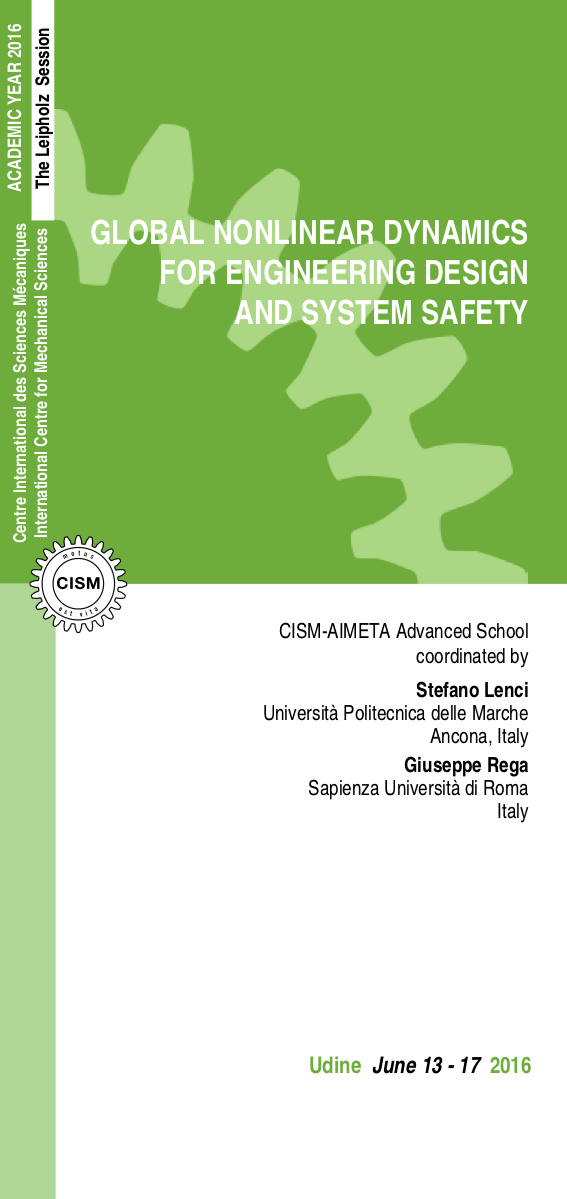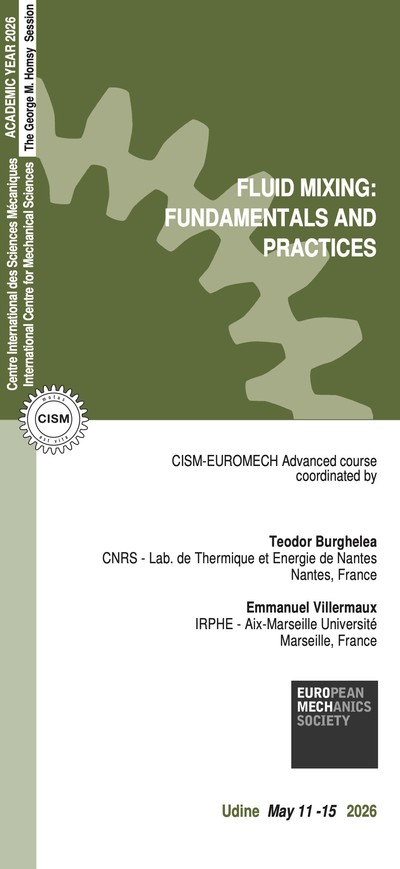Global nonlinear dynamics in applied mechanics dates back to the Eighties, when the scientific community realized the importance of nonlinear phenomena in view of technical applications. Since then, the area has been evolving in a revolutionary way, with applications to a wide variety of systems made possible by sophisticated analytical, geometrical and computational techniques employing powerful concepts/tools of bifurcation and chaos theory, properly updated and complemented with a view to engineering aims and meaningful experimental verifications. The achievements occurred over the last thirty years entail a substantial change of perspective when dealing with vibration problems, and are deemed ready to meaningfully affect the analysis, control and design of mechanical/structural systems. This course aims at highlighting the important, yet still generally overlooked, role that the relevant concepts/tools may play as regards the load carrying capacity and safety of engineering systems. Attention is paid to the evolution and update of the old concept of stability, as ensuing from consideration of global dynamics. Upon dwelling on bifurcation and complexity, theoretical and practical stability, recent results obtained for a variety of systems in applied mechanics and structural dynamics are overviewed in terms of analysis and control of nonlinear phenomena. Local and global stability of systems are discussed by also considering the effects of imperfections or small, but finite, dynamical perturbations, along with variations of control parameters. All of them may arise in technical applications and experiments, and are to be properly considered in design in order to secure the system capability to sustain changes without modifying the desired outcome. Robustness of solutions against variations of initial conditions or control parameters, and system dynamical integrity, are fundamental concepts to be addressed in view of global phenomena, which may entail the existence of merely residual levels of robustness and integrity, unacceptable in technical applications. The overall transition from a local to global safety concept has also major implications as regards the feasibility and effectiveness of techniques aimed at controlling nonlinear dynamics, which may drastically change according to whether the control goal is local or overall. All these issues, which also permit to explain partial discrepancies between experimental and theoretical/ numerical results based on merely local analyses, are overviewed for systems from macro- to micro/nano- mechanics. Archetypal discrete systems and reduced order models of continuous systems are addressed. Specific phenomenological aspects are discussed, paying attention to the common or distinguishing nonlinear dynamical features expected to play a meaningful role in analysis and design engineering. The course is addressed to doctoral students and postdocs, but also to academics, industrial researchers and practicing engineers in mechanical, civil and aeronautical engineering, as well as in applied physics or applied mathematics.
Thompson JMT, Stewart B (2002), Nonlinear Dynamics and Chaos, 2nd Edit., Wiley, New York. Nayfeh AH, Balachandran B (1995), Applied Nonlinear Dynamics, Wiley, New York. Lenci S, Rega G, Ruzziconi L (2013), The dynamical integrity concept for interpreting/predicting experimental behavior: from macro- to nano-mechanics, Philosophical Transactions of the Royal Society A: Mathematical, Physical & Engineering Sciences, 371(1993), 20120423. Silva FMA, Goncalves PB (2015), The influence of uncertainties and random noise on the dynamical integrity of a system liable to unstable buckling, Nonlinear Dynamics, DOI: 10.1007/s11071- 015-2021-5. Rega G, Lenci S, Thompson JMT (2010), Controlling chaos: The OGY method, its use in mechanics, and an alternative unified framework for control of non-regular dynamics, in Nonlinear Dynamics and Chaos: Advances and Perspectives (Eds M Thiel et al), Springer, 211-269. Younis MI (2011), MEMS Linear and Nonlinear Statics and Dynamics, Springer, New York. Sun JQ, Luo ACJ (Eds) (2012), Global Analysis of Nonlinear Dynamics, Springer, New York.
Paulo B. Goncalves (None)
6 lectures on: Structural instability, dynamic buckling; transient and steady-state response; nonlinear dynamics of structures liable to unstable interactive buckling; reduced order modeling, modal coupling and global dynamics; parametrically excited cylindrical shells; stochasticity in system parameters and excitation: effects on system response and dynamic integrity.
Stefano Lenci (None)
7 lectures on: Dynamic integrity: interpreting/predicting experimental response, getting hints towards load carrying capacity of systems; techniques for control of chaos; a unified framework for controlling global dynamics; response of uncontrolled/controlled systems in macro- and micro-mechanics; from simple models to more realistic multidimensional systems: high-speed computation of basins of attraction.
Giuseppe Rega (None)
7 lectures on: Revisiting nonlinear dynamics in the engineering design perspective: theoretical vs practical stability, local vs global dynamics; dynamic integrity concept and tools: safe basin, robustness of competing attractors, erosion and escape as failure mechanisms; analyzing global dynamics of engineering systems; nonlinear dynamics, local and global control of atomic force microscopes; a novel paradigm for safe and aware design.
Jian-Qiao Sun (None)
6 lectures on: Cell mapping methods for computation of basins of attraction: fundamentals and new developments; computational nonlinear dynamics; parallelized multi-degree-of-freedom cell mapping; global analysis and control of deterministic and stochastic systems; bifurcations of forced oscillators with fuzzy uncertainties; dynamical systems with time delay.
Michael Thompson (None)
6 lectures on: Basic concepts in theoretical stability of systems and structures; fundamentals on bifurcation and global dynamics; static-dynamic analogy.
Mohammad Younis (None)
6 lectures on: MEMS and NEMS: fundamentals and applications (micro-resonators, -sensors, -switches, carbon nanotubes, atomic force microscopes); transduction methods in MEMS/NEMS; modeling of MEMS; multistability in MEMS/NEMS; global dynamics and escape: pull-in instability, jump-to-contact; predicting experimental response in micro-mechanics.
The registration fee is of 575,00 Euro + VAT taxes*, where applicable (bank charges are not included). The registration fee includes a complimentary bag, four fixed menu buffet lunches (Friday subject to numbers), hot beverages, downloadable lecture notes and wi-fi internet access. Applicants must apply at least one month before the beginning of the course. Application forms should be sent on-line through our web site: http://www.cism.it or by post. A message of confirmation will be sent to accepted participants. If you need assistance for registration please contact our secretariat. Applicants may cancel their course registration and receive a full refund by notifying CISM Secretariat in writing (by email) no later than two weeks prior to the start of the course. If cancellation occurs less than two weeks prior to the start of the course, a Euro 50,00 handling fee will be charged. Incorrect payments are subject to Euro 50,00 handling fee. A limited number of participants from universities and research centres who are not supported by their own institutions can be offered board and/or lodging in a reasonably priced hotel or students' dormitories, if available. Requests should be sent to CISM Secretariat by
April 13, 2016along with the applicant's curriculum and a letter of recommendation by the head of the department or a supervisor confirming that the institute cannot provide funding. Preference will be given to applicants from countries that sponsor CISM. Information about travel and accommodation is available on our web site, or can be mailed upon request.
* Italian VAT is 22%.





